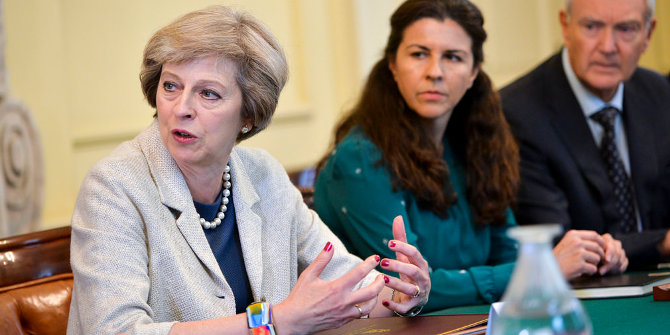 Through its withdrawal from the EU, the UK diminished its overall usefulness to other actors. Little wonder, then, that efforts to demonstrate the utility of Global Britain at the G7 summit were overshadowed by the complexities of withdrawal, writes Benjamin Martill.
Through its withdrawal from the EU, the UK diminished its overall usefulness to other actors. Little wonder, then, that efforts to demonstrate the utility of Global Britain at the G7 summit were overshadowed by the complexities of withdrawal, writes Benjamin Martill.
The G7 meeting between the leaders of predominantly Western and democratic states, which took place in Carbis Bay, Cornwall, is an opportunity to set priorities for the coming years and for individual countries to show leadership on the world stage. The Heads of State (or government) of the US, UK, France, Germany, Canada, Japan and Italy, flanked by the President of the European Council and the President of the European Commission, spent the week posing for photographs and hashing out the bare bones of their position on common threats.
There was notable, if arguably insufficient, movement on the ‘three Cs’: COVID-19, climate change, and China, with an agreement to share a greater number of vaccines with the global South, renewed commitments to lower carbon emissions, and American proposals for an ‘alliance’ against China, on which Joe Biden is arguably as hawkish as his predecessor.
There was also talk of renewing commitments to existing arrangements after the tumultuous past few years, with talk about the ‘indestructible’ Anglo-American relationship from Boris Johnson, the launching of a new ‘Atlantic charter’, and efforts to combat tax avoidance by big tech, with movement towards the harmonisation of tax rates. Indeed, the sub-text of this year’s summit, six months after Biden’s inauguration, is that ‘America is back’. Gone are the ally-baiting policies of the Trump administration, the incendiary rhetoric about America’s foreign entanglements, and his inward-looking ‘America First’ agenda.
Something similar might be said in relation to the UK, too, since Britain’s hosting of the G7 offered a prominent opportunity for Johnson to showcase his post-Brexit, ‘Global Britain’ agenda in full swing. As a Brexit supporter, Johnson hitched his political fortunes to the idea that the UK could be more successful, nimbler, and more relevant if it freed itself from the ‘shackles’ of the EU. Proponents of Global Britain have advocated a focus on Britain’s extra-European activities, capitalising on ties within the Commonwealth and the ‘Anglosphere’, and prioritising relationships with existing allies (like the US) and emerging centres of increasing economic and geopolitical importance, such as Southeast Asia.
But the challenge that is Brexit for the UK’s role and reputation has been hard to shake, let alone link to any positive outcomes. One reason is that the practicalities of Brexit, and their political implications, are still causing problems some five years following the EU referendum. This is most notable in the case of Northern Ireland. In his haste to agree the terms of the UK’s withdrawal from the EU in 2019, Johnson negotiated as a replacement for Theresa May’s infamous ‘backstop’ a Protocol for Northern Ireland which established a de facto border in the Irish Sea, inflaming Unionist tensions and throwing the erstwhile Brexit supporters, the Democratic Unionist Party, under the bus.
After the UK fell out of love with the protocol, Johnson promised initially to abrogate it – through the Internal Market Bill – and the government has dragged its feet on implementation. This has infuriated the EU institutions and member states, who have sought to use the G7 summit to pressure Johnson into implementing the protocol, resulting in several high-profile diplomatic spats in recent days. The US offered a rare rebuke of the UK over its seeming lack of commitment to upholding the peace process and the Good Friday Agreement. While the UK government is keen to portray the protocol as an EU imposition, it was, of course, an invention of the UK government, and continues to offer proof that no solution exists to provide for the absence of borders between Northern Ireland and both the Irish Republic and the UK as long as Britain seeks to diverge from EU regulations.
But the legacy of Brexit for Britain’s role in the world runs deeper than such (admittedly important) hangovers from the complexities of withdrawal. Britain’s historical commitment to the liberal international order, unsurprisingly strong for a state which helped to construct this order and which benefits from it, has been dented by Brexit in particular.
Britain is also less useful as an international partner than when it was a member of the EU. The great irony is that supporters of Global Britain saw Brexit as a means of strengthening other relationships, like the Atlantic alliance and the Commonwealth, but failed to realise the extent to which Britain’s value to these partners lay in its EU membership, its influence in Brussels, and London’s status as a major financial hub within the single market.
The UK’s reputation as a trusting and law-abiding actor has also been eviscerated by wrangling over the commitments the UK previously signed up to. The high-profile willingness to abrogate highly salient recent agreements has undermined trust in the UK and this will be difficult to rebuild. One might argue, of course, that Johnson’s specific leadership style, and his preference for quick deals over institutionalised agreements and rules-based multilateralism, will not outlast his tenure in office, limiting the long-term damage to the UK. But even in a post-Johnson era, allies will have to worry about future leaders and their commitment to British soft power and key partners.
And Brexit supporters don’t just want Brexit. Many of them are sceptical of the other bases of Britain’s liberal foreign policy identity, including the proportion of GDP spent on overseas aid (recently, and shambolically, subject to a ‘temporary cut’), the UK’s alignment with democratic nations against such would-be competitors as Russia and China, and the rules-based international trading regime. In other words, while it is hard enough to de-link the EU from the rest of the international liberal order, many Brexit supporters are not keen on the underlying assumptions on which this order is itself based.
Through its withdrawal from the EU, the UK diminished its usefulness to other actors, upended positive and long-standing relationships, upended the liberal goals of UK foreign policy, tarnished the UK’s reputation as a champion of international law, and helped undermine one of the power-centres of the rules-based liberal order (in the EU).
Little wonder, then, that efforts to demonstrate the utility of Global Britain at the G7 summit would be overshadowed by squabbling about Brexit hangovers. Far from demonstrating the success of Brexit, the summit bears the scars of the withdrawal process, showing to the world the diminished credibility of British multilateralism and weakened soft power. While America is back, for now, it will take more than choice soundbites to show the UK’s role is anything but diminished post-Brexit.
____________________
 Benjamin Martill is Lecturer in Politics and International Relations at the University of Edinburgh.
Benjamin Martill is Lecturer in Politics and International Relations at the University of Edinburgh.
Featured image credit: Prime Minister Boris Johnson arrives at Carbis Bay Hotel, by Simon Dawson / No 10 Downing Street on Flickr (CC BY-NC-ND 2.0).







